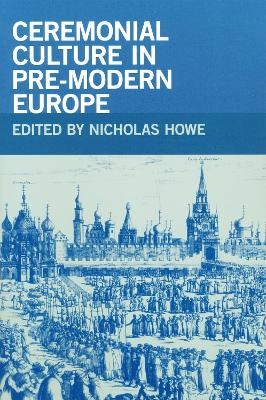
Ceremonial Culture in Pre-Modern Europe
Seiten
2007
University of Notre Dame Press (Verlag)
978-0-268-03075-9 (ISBN)
University of Notre Dame Press (Verlag)
978-0-268-03075-9 (ISBN)
- Lieferbar (Termin unbekannt)
- Versandkostenfrei innerhalb Deutschlands
- Auch auf Rechnung
- Verfügbarkeit in der Filiale vor Ort prüfen
- Artikel merken
The essayists in this volume identify and recover the excitement and dynamism that characterized ceremonial culture in pre-modern Europe. What emerges from each essay is a deeper understanding that any ceremony is, finally, an attempt to close the divide between abstract and literal, ideal and actual.
By enabling the spiritual or ineffable to register as visible and palpable, ceremonies perform the essential cultural work of ensuring continuity of belief and practice across generations. In the process, each ceremony becomes a visual drama with highly scripted acts, movements, and rhythms.
Unlike anthropologists in the field, scholars of the medieval and early modern world cannot witness ceremonies—the processions, dramas, rituals, and liturgies—and their choreography, or how they engaged with time and space. Denied the possibility of personal observation, how are historians to understand ceremonies such as a Catholic liturgical procession moving through a medieval town or the triumphal entry of a Renaissance ruler into a subjected city? Fortunately, considerable documentary, visual, and material evidence survives from Europe to help scholars frame necessary questions about pre-modern ceremonies.
The essayists in this volume identify and recover the excitement and dynamism that characterized ceremonial culture in pre-modern Europe. Each turns to key issues: the relation between public and private space, the development of fully-realized dramas and rituals from earlier forms, and the semiotic code that ceremonies manifested to their audiences. Their subjects include the Adventus procession at Chartres; Epiphany and Palm Sunday rituals in medieval Moscow; the staged entry of the future Emperor Charles V into Bruges in 1515; and ceremonies in Italian Renaissance cities interpreted through the lens of Renaissance optical theory. What emerges from each essay is a deeper understanding that any ceremony is, finally, an attempt to close the divide between abstract and literal, ideal and actual.
By enabling the spiritual or ineffable to register as visible and palpable, ceremonies perform the essential cultural work of ensuring continuity of belief and practice across generations. In the process, each ceremony becomes a visual drama with highly scripted acts, movements, and rhythms.
Unlike anthropologists in the field, scholars of the medieval and early modern world cannot witness ceremonies—the processions, dramas, rituals, and liturgies—and their choreography, or how they engaged with time and space. Denied the possibility of personal observation, how are historians to understand ceremonies such as a Catholic liturgical procession moving through a medieval town or the triumphal entry of a Renaissance ruler into a subjected city? Fortunately, considerable documentary, visual, and material evidence survives from Europe to help scholars frame necessary questions about pre-modern ceremonies.
The essayists in this volume identify and recover the excitement and dynamism that characterized ceremonial culture in pre-modern Europe. Each turns to key issues: the relation between public and private space, the development of fully-realized dramas and rituals from earlier forms, and the semiotic code that ceremonies manifested to their audiences. Their subjects include the Adventus procession at Chartres; Epiphany and Palm Sunday rituals in medieval Moscow; the staged entry of the future Emperor Charles V into Bruges in 1515; and ceremonies in Italian Renaissance cities interpreted through the lens of Renaissance optical theory. What emerges from each essay is a deeper understanding that any ceremony is, finally, an attempt to close the divide between abstract and literal, ideal and actual.
Nicholas Howe (1953–2006) was professor of English at the University of California, Berkeley, and the author and editor of several books, including Migration and Mythmaking in Anglo-Saxon England (Notre Dame Press, 2001).
| Erscheint lt. Verlag | 15.1.2007 |
|---|---|
| Zusatzinfo | 35 Halftones, unspecified |
| Verlagsort | Notre Dame IN |
| Sprache | englisch |
| Maße | 152 x 229 mm |
| Gewicht | 255 g |
| Themenwelt | Geschichte ► Teilgebiete der Geschichte ► Kulturgeschichte |
| Sozialwissenschaften ► Ethnologie ► Volkskunde | |
| Sozialwissenschaften ► Soziologie | |
| ISBN-10 | 0-268-03075-8 / 0268030758 |
| ISBN-13 | 978-0-268-03075-9 / 9780268030759 |
| Zustand | Neuware |
| Haben Sie eine Frage zum Produkt? |
Mehr entdecken
aus dem Bereich
aus dem Bereich
der stille Abschied vom bäuerlichen Leben in Deutschland
Buch | Hardcover (2023)
C.H.Beck (Verlag)
23,00 €
eine Geschichte der Welt in 99 Obsessionen
Buch | Hardcover (2023)
Klett-Cotta (Verlag)
22,00 €


